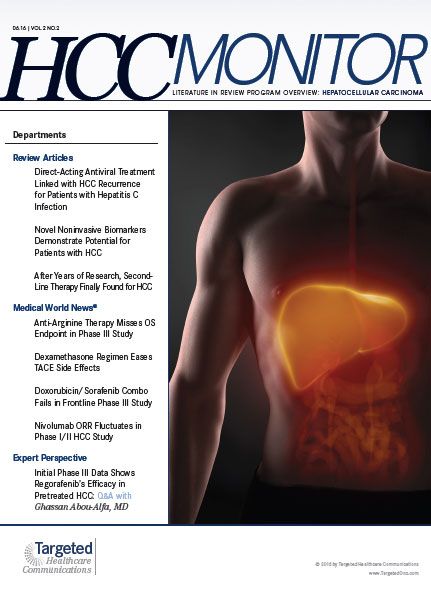Doxorubicin/Sorafenib Combo Fails in Frontline Phase III Study
Upfront treatment with the combination of doxorubicin and sorafenib did not improve overall survival compared with sorafenib alone for patients with advanced hepatocellular carcinoma .
The median OS with sorafenib alone was 10.5 months compared with 8.9 months with the combination (HR, 1.06; 95% CI, 0.8-1.4;P= .24). The median progression-free survival (PFS) was 3.9 months with sorafenib alone versus 4 months with the combination (HR, 0.9; 95% CI, 0.72-1.2;P= .98). Based on the lack of benefit, the study was halted early, after an interim analysis.
“Median OS with sorafenib was comparable to historic controls at 10.5 months. The combination showed a median survival of close to 9 months, this showed that additional doxorubicin did not add anything, and as such, this study is reported as negative,” said lead investigator Ghassan K. Abou-Alfa, MD, medical oncologist, Memorial Sloan Kettering Cancer Center.
In the CALGB 80802 trial, 356 patients with advanced, unresectable HCC were randomized to receive 6 cycles of doxorubicin plus sorafenib (n = 180) or sorafenib alone (n = 176). Doxorubicin was administered at 60 mg/m2 every 21 days. Sorafenib was administered at 400 mg twice daily in each arm.
The median age of patients was 62 years and the majority were male (86%). Most patients had AJCC stage IV disease (61%) and the Child-Pugh grade was A. AFP levels were above normal for 87% and 81% of those in the combination and single-agent arms, respectively.
Hepatitis B infection was noted in 16% of patients, and 34% of patients had hepatitis C virus infection. Both hepatitis viruses infected 6% and 4% of patients, in the combination and single-agent arms, respectively.
Treatment-related grade ≥3 adverse events (AEs) were more common with the combination. The most common grade ≥3 AEs with the combination and single-agent, respectively, were fatigue (10% vs 7%), hypertension (3% vs 13%), leukopenia (11% vs 0%), neutropenia (33% vs 0%), thrombocytopenia (14% vs 1%), and hand-foot skin reaction (10% vs 14%). Additionally, 4.3% of those in the combination arm experienced grade ≥3 cardiac toxicity.
The phase III study was based on promising early data from a phase II trial. In this study, doxorubicin plus sorafenib demonstrated a median OS of 13.7 months compared with 6.5 months with doxorubicin alone (P= .006). These findings of 80802 further emphasize the importance of phase III results when selecting therapy for patients with HCC.
“CALGB 80802 was the first NCI-sponsored multicooperative group hepatobiliary cancer phase III study,” said Abou- Alfa. “A series of scientific correlates await reporting.”
REFERENCE
- Abou-Alfa GK, Niedzwieski D, Knox JJ, et al. Phase III randomized study of sorafenib plus doxorubicin versus sorafenib in patients with advanced hepatocellular carcinoma (HCC): CALGB 80802 (Alliance).J Clin Oncol. 2016;34 (suppl; abstr 4003).

Survivorship Care Promotes Evidence-Based Approaches for Quality of Life and Beyond
March 21st 2025Frank J. Penedo, PhD, explains the challenges of survivorship care for patients with cancer and how he implements programs to support patients’ emotional, physical, and practical needs.
Read More